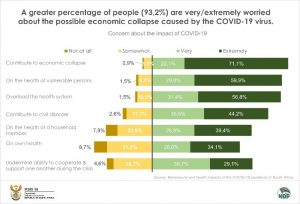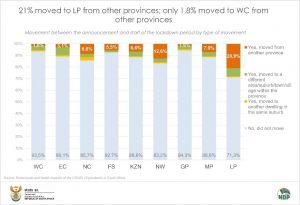COVID-19: Greater concern about economic collapse than health
Statistics South Africa (Stats SA) has embarked on a series of three online surveys to measure the impact of the COVID-19 pandemic on households in the country. This report is the first wave in the series and focuses on health-related aspects in terms of behaviour, knowledge and perceptions with regard to COVID-19. The survey was conducted online on the Stats SA website and was open to any person who wanted to participate and who could access and complete the survey. This is the first survey that Stats SA conducted using the convenience sampling approach. The number of responses obtained for the survey was 3 591, which is, in itself, not representative of the general population of South Africa
The survey, Behavioural and health impacts of the COVID-19 pandemic in South Africa, reveals that a greater percentage of respondents are worried about the possible economic collapse caused by the COVID-19 pandemic. 93,2% indicated that they are very or extremely concerned about the possible economic collapse; 88,9% are concerned about the health of vulnerable people like elderly family members; 88,2% are concerned about the overload of the health system and 79,7% are concerned about the civil disorder that may result as a consequence of the COVID-19 virus.
Of those that responded, most (94,2%) were living in formal dwellings: either a free-standing house, townhouse or a cluster house (81,6%), or in a flat or apartment in a block of flats (12,6%). Less than one per cent (0,9%) lived in an informal dwelling. More than two-thirds (69,1%) of respondents had a full-time job (receiving a monthly salary); 11,6% of respondents were self-employed, whilst 8,1% were unemployed based on self-reported employment status.
Respondents residing in Gauteng were the least inclined to have moved from another province in the period between the announcement and the start of the lockdown period. 94,3% of Gauteng respondents remained in the province, while 20,9% of respondents residing in Limpopo over the lockdown period indicated that they moved from another province in the period between the announcement and the start of the lockdown period.
Under the lockdown rules, citizens were only permitted to seek medical care, buy essential goods, visit the pharmacy, access banking and other essential services, get petrol or collect a social grant.
Almost 60% of respondents indicated that they had to go out on occasion, whilst 40,2% managed to stay at home all the time. Most of the respondents who had gone out for grocery shopping in the week prior to the survey did so once or twice (83,2%) and 7,0% went grocery shopping 3 to 5 times. Few respondents managed to not go out for grocery shopping at all (9,0%).
With regards to going to the pharmacy, the majority of respondents (55,5%) managed to not go out to the pharmacy at all, whilst 43,8% went out to the pharmacy once or twice. Less than one per cent (0,6%) went to the pharmacy 3 to 5 times.
Respondents were also asked to indicate if they or members of their household wanted to access health care but have been unable to do so since lockdown. The majority of respondents (93,7%) indicated that they or their household members did not need to access health care, while 4,5% responded that they or a household member needed to access health care but had been unable to do so.
Respondents generally had minimal physical contact with infected persons (3,6%), whilst 2,6% of respondents indicated that they suspected that they have or had COVID-19 in the past 30 days.
While the survey gives some insight into the impact of the COVID-19 pandemic on households in the country, Stats SA cautions that the study has certain limitations. The survey is based on a non-probability, convenience sample, and people who had access to technology (e.g. smartphones and computers or the internet) were the only ones who completed the survey. This makes the survey biased in terms of the type of respondents that completed the survey.
If you missed the link in the article above, the complete report is available here.



